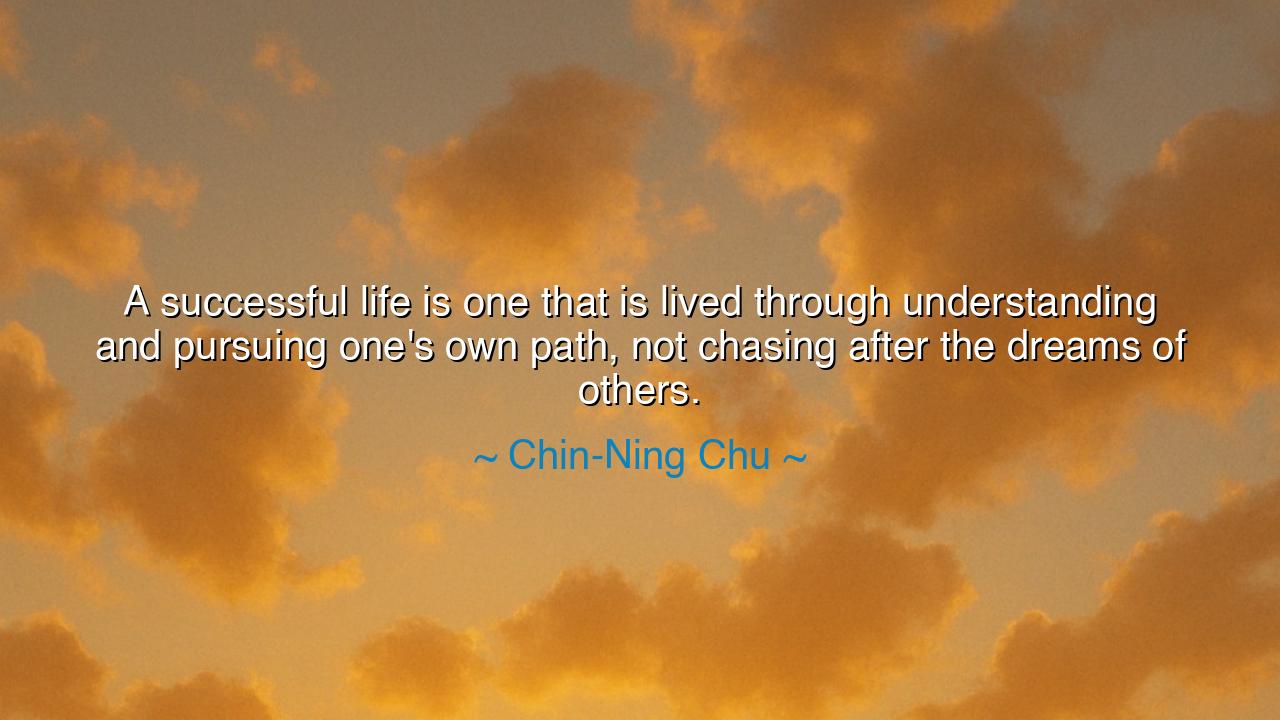
A successful life is one that is lived through understanding and
A successful life is one that is lived through understanding and pursuing one's own path, not chasing after the dreams of others.






In the luminous and discerning words of Chin-Ning Chu, the celebrated strategist and author of The Art of War for Women, we encounter a timeless truth about the nature of purpose and authenticity: “A successful life is one that is lived through understanding and pursuing one’s own path, not chasing after the dreams of others.” This is not a mere reflection on ambition; it is a call to self-awareness, a commandment for the soul to awaken to its own rhythm rather than be seduced by the illusions of imitation. Chu, steeped in the philosophies of Sun Tzu and the wisdom of Eastern thought, reminds us that success is not measured by comparison, but by alignment — the harmony between what one is and what one is meant to become.
The origin of this quote lies in Chin-Ning Chu’s lifelong meditation on personal power and strategy. Born in China and raised amid cultural and political turmoil, she understood early that survival and success required not conformity, but clarity of purpose. Her teachings blend the subtle strength of Eastern philosophy with the fierce practicality of the modern world. When she speaks of “understanding one’s own path,” she invokes the same wisdom that guided sages, warriors, and emperors alike — that a life without self-knowledge is like a ship without a compass. For even if the ship sails swiftly, it drifts aimlessly when it does not know its direction. Thus, to chase “the dreams of others” is to surrender one’s destiny to the winds of imitation, losing both freedom and fulfillment.
To live by this wisdom demands courage, for the world constantly tempts us to abandon our own road. It tells us what success should look like — wealth, fame, admiration — and too often, we obey. Yet as Chin-Ning Chu reminds us, the dream that belongs to another can never fit the shape of our soul. The pursuit of imitation may bring fleeting applause, but it breeds emptiness, for we have betrayed our own essence in the process. True success is not found in the mirrors of others’ approval, but in the quiet certainty that one’s steps, however small, are guided by the truth of the heart.
Consider the life of Vincent van Gogh, the painter whose art was dismissed in his own time, yet who remained steadfast on his path. The world saw madness where he saw beauty; they mocked his colors, his style, his intensity. Had he sought to paint as others did, he might have known acceptance, but not greatness. His genius lay in understanding and pursuing his own path, in painting the world as his soul perceived it. Though he lived in poverty and died misunderstood, his art endures as a testament to this principle — that the one who honors their own truth transcends the judgment of their age. His story is the embodiment of Chu’s wisdom: that a life faithful to one’s inner calling, even if solitary, is more successful than one built on imitation and compromise.
The ancients, too, spoke of this path. In the Taoist texts, it is called the Tao, the Way — the natural course of one’s being that leads to harmony with the universe. The sage does not strive to outshine others; he flows as water flows, shaping his own path through persistence and grace. So it is with life: when you follow your own way, you move with the current of truth; when you chase another’s, you struggle against it. Chu’s teaching is a modern echo of this ancient truth — that success without self-knowledge is illusion, but humble progress along one’s own path is liberation.
The lesson is clear, and it is urgent. Before you strive, understand yourself. Before you run, know where your road leads. Ask not, “What should I do to succeed?” but rather, “What calls me to life?” For the pursuit of another’s dream will always end in disillusionment, but the pursuit of your own, even when difficult, will shape your character and deepen your spirit. Do not let the noise of others’ ambitions drown out your inner voice. The world does not need another imitation; it needs the full expression of your uniqueness. That is your true contribution, your sacred work.
So, my child of reflection and courage, remember Chin-Ning Chu’s wisdom: success is not found in comparison, but in authenticity. Do not measure your life by the paths of others; measure it by the distance you have traveled within yourself. Seek to know your nature — your gifts, your passions, your limitations — and let them guide you as the stars guided the sailors of old. When you walk your path with honesty and purpose, you will not need the approval of the world, for your spirit itself will testify that you are where you were meant to be. And in that quiet knowing, you will have achieved the truest form of victory — a life lived in harmony with one’s own soul.






AAdministratorAdministrator
Welcome, honored guests. Please leave a comment, we will respond soon